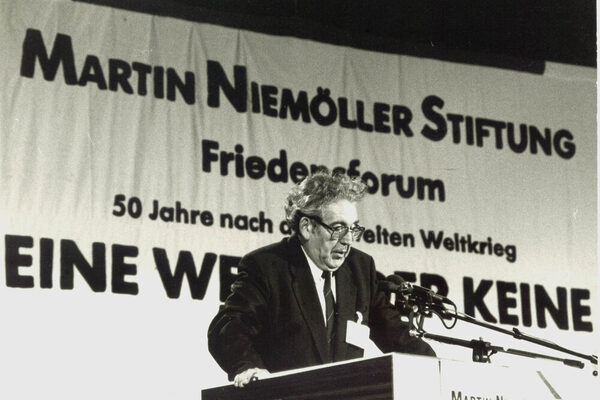Martin Niemöller Foundation e.V.
Founding members of the Martin Niemöller Foundation, which was established on January 15, 1977, were the sociologist Eugen Kogon and the theologian Heinz Kloppenburg. Martin Niemöller had gladly agreed to name the association, which sees it as its task to promote understanding, détente and peace, after him. Outstanding events in the association's history in the early years were the peace talks in Moscow in 1982, the colloquium "One World or None" in 1986 and the major peace congress in 1988. In 1991, the office moved from Cologne to Wiesbaden
Today, the Martin Niemöller Foundation concentrates on organizing events and conferences in the Wiesbaden area and the Rhine-Main region. There is regular cooperation, for example, with the event series "January 27 - Remembering and Commemorating" and with the Protestant Bergkirche parish, where the foundation is currently based. Other cooperation partners include the Active Museum Spiegelgasse for German-Jewish History, the Society for Christian-Jewish Cooperation and the Protestant Deanery in Wiesbaden.
With the "Peremoha" project, the Martin Niemöller Foundation is supporting one of the many villages in Ukraine burned by German soldiers during the Second World War. The Martin Niemöller Foundation awards the Julius Rumpf Prize to individuals or groups who are committed to tolerance and non-violence. The prize was donated by Dr. Günther and Ingrid Rumpf and is intended to commemorate the market church pastor Julius Rumpf. A central concern is also to evoke the memory of the personality and life's work of Martin Niemöller. For this reason, the association has been working together with the Martin Niemöller School in Wiesbaden for many years.
The chairmen of the Martin Niemöller Foundation were Heinz Kloppenburg (1980-86), Eugen Kogon (1986-90), Walter Jens (1990-95), Martin Stöhr (1995-2010) and Michael Karg (since 2010).
